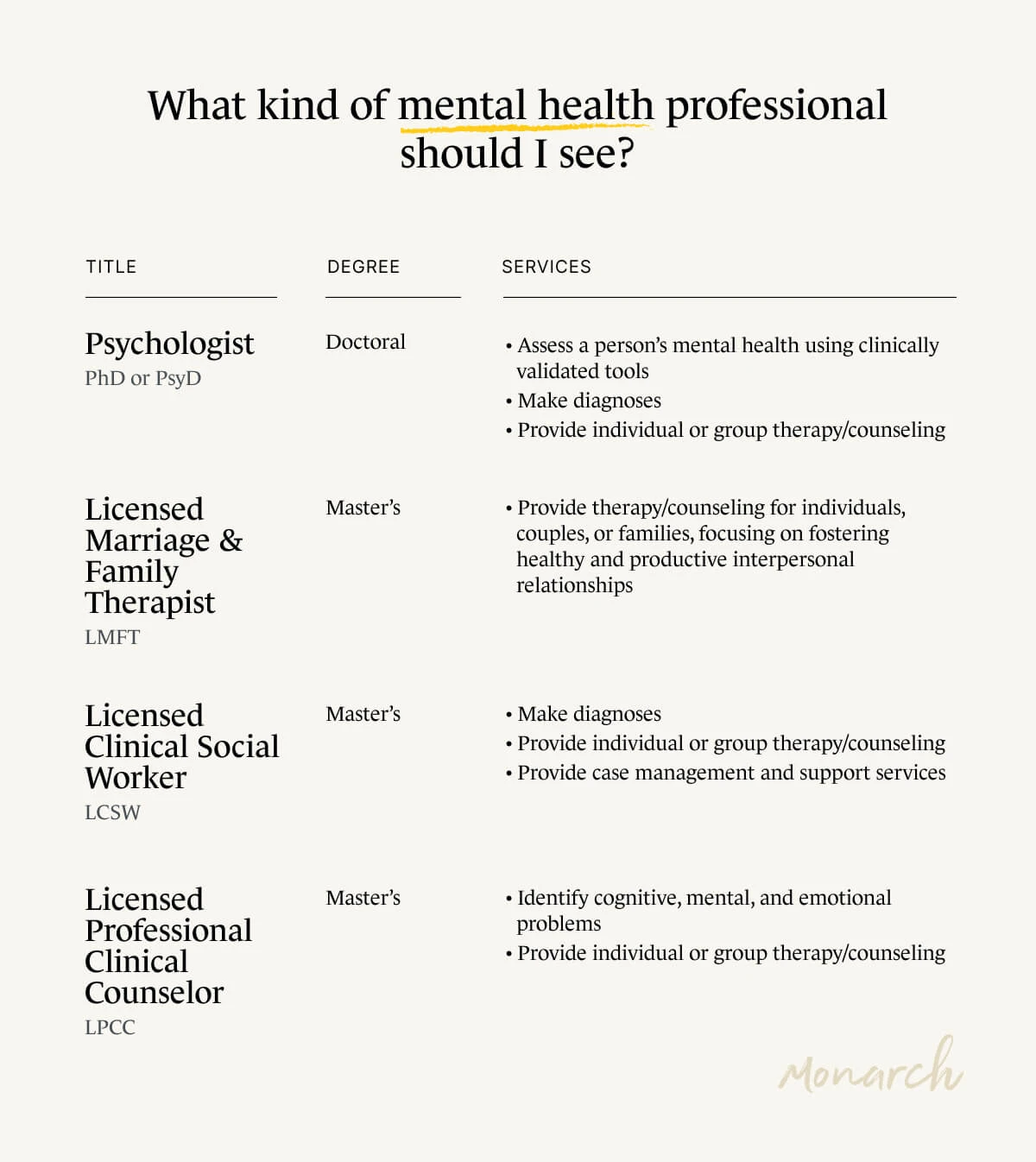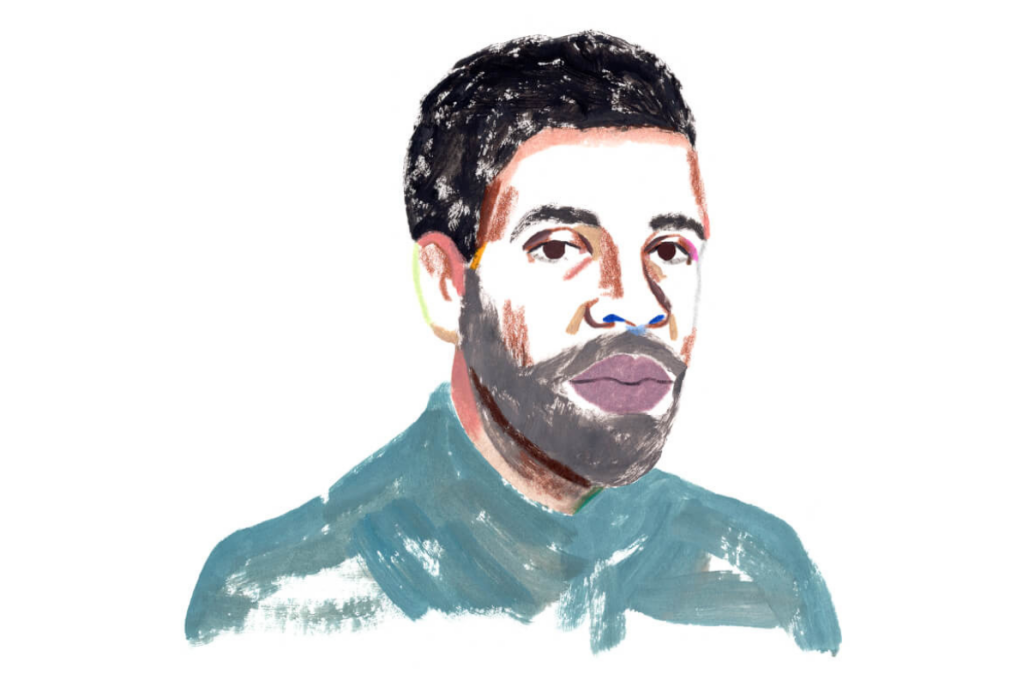What are the different kinds of therapist?
Do I need counseling or therapy?
Should I see a therapist or a psychologist... or a psychiatrist?
If you're considering starting, re-starting, or continuing with therapy, congrats. That's an important decision.
Should I see a therapist or a psychologist... or a psychiatrist?
Understanding the different types and styles of therapy can be beneficial.
It's also helpful to understand which type of mental health professional—therapist, counselor, psychologist, or psychiatrist—is best-suited to help support you in your specific needs and goals. (As well as which type of clinician may be covered by your insurance.)
Read on to find out about the different kinds of therapists and mental health professional and which may be best for you.

How to choose the right therapist
First, you may want to start by asking yourself what you’re hoping to get from therapy.
Do you have a particular trauma you want to deal with and address? Do you need help managing anxiety symptoms or adult ADHD?
Or, perhaps you're looking for guidance as to how to practice more self-compassion, improve your self-esteem, or establish healthy habits?
There’s no incorrect—or inadequate—reason to get therapy.
However, getting yourself some clarity in your issues, concerns, and goals, will help you find the right kind of mental health professional to book a therapy session with.

What are the different kinds of therapists?
LMFT, LCSW, Psy.D., Ph.D? Finding a counselor or therapist can feel a bit like eating alphabet soup.
What do all these letters stand for?
And which kind of therapist is right for your individual needs?
LMFT, LCSW, Psy.D., Ph.D? What do all these letters stand for?
Here's what you need to know about the different titles, licenses, and and names for mental health professionals.
1. Licensed professional counselors (LPCs)
Licensed professional counselors include many different kinds of licensed therapists as licensure options vary from state-to-state in the U.S.
Regardless of the specific licensing letters, all of these clinicians must hold at least a master’s degree in counseling and pass a state licensing exam.
Types of LPCs include licensed mental health counselors (LMHCs), licensed clinical professional counselors (LCPCs), licensed professional clinical counselors (LPCCs), and licensed clinical mental health counselors (LCMHCs).
Regardless of the specific licensing letters, all of these clinicians must hold at least a master’s degree in counseling and pass a state licensing exam.
Most LPC certifications also require 1,000 to 3,000 hours of training before allowing a therapist to practice independently.
2. Licensed marriage and family therapists (LMFTs)
Licensed marriage and family therapists have master's degrees in marriage and family therapy or psychology.
LMFTs are licensed to evaluate, diagnose, and treat mental and emotional disorders, health issues, and behavioral issues.
They provide one-on-one psychotherapy as well as couples therapy or marriage counseling and family therapy.

3. Licensed clinical social workers (LCSWs)
Licensed clinical social workers typically work in a counseling capacity where they provide support and guidance to individuals struggling with all types of mental health issues and disorders.
LCSWs must have a master's degree, and most have their master’s degree in social work. They also require thousands of hours of clinical social work practice, and state licensure.
4. Psychologists (Ph.D.s or Psy.D.s)
Psychologists have Ph.D.s in Psychology or Psy.Ds.
Generally speaking, psychologists are trained in talk therapy, and they focus on diagnosing, assessing, and treating mental disorders.
5. Psychiatrists (M.D.s)
Psychiatrists have medical degrees—hence the initials “M.D.”
They're primarily focused on the chemical components of the brain and of mental health.
Psychiatrists' expertise lies in diagnosing brain disorders and mental illnesses on a chemical level, and when necessary, prescribing pharmaceutical medication.

Should I see a psychiatrist or a psychologist?
More often than not, regular visits with a psychiatrist are much shorter than those with a psychologist, as the sessions are limited to assessing the effectiveness of prescribed drugs on specific symptoms.
Often, we can be referred to a psychiatrist by a psychologist or therapist who believes there might be an underlying chemical issue and that medication should be considered as part of treatment.
All psychotherapists can assess, diagnose, and treat various mental or emotional disorders.
Similarly, if a psychiatrist prescribes medication to us, and believes that we might benefit from psychotherapy, they may be able to offer us references to therapists. (Some psychiatrists still also practice talk therapy themselves.)
If a psychologist determines there might be a chemical issue, they may refer their client to a psychiatrist whose medical expertise may support the work the psychologist is undergoing with a client.
Other kinds of therapists
The word “therapist” can apply to any number of practitioners—including speech therapists, physical therapists, etc.or the purposes of this post, we’ll limit the scope to behavioral health therapists (that is, psychotherapists).
The title is often used as an umbrella category for counselors, social workers, life coaches (more on these later), and other professionals who employ a variety of methodologies or who specialize in different focus areas.
Because the word can be applied so broadly, you’ll find psychotherapists who have master’s degrees, doctorate degrees, medical degrees, or all three.
All psychotherapists can assess, diagnose, and treat various mental or emotional disorders.
There is no one type of psychotherapy or psychotherapist. There are therapists who lead group therapy sessions where they work with several people who have similar concerns to encourage a sort of Socratic method of resolution.
There are addiction and recovery therapists, who support those with substance abuse issues navigate the choppy waters of recovery. And many more.

What's a social worker?
In many U.S. states, social workers are officially deemed “psychotherapists,” though they have specific licensing requirements.
Licensed clinical social workers, or LCSWs, differ slightly from other talk therapists in that they not only work with individuals and families, but they also consider how those individuals fit into their broader communities.
That is, in addition to counseling and talking cure, LCSWs can help connect people with resources (including government programs) to encourage mental wellness.
What’s the difference between a therapist and a counselor?
The term “counselor” is widely used interchangeably with “therapist,” though technically, counseling is a separate area of focus.
Some therapists who have completed a master’s program (or a Ph.D. program) in Counseling Psychology differentiate themselves from other therapists by their concentration on development.
In many states you’ll find “counselor” to mean therapist.
This means they work proactively with their patients to achieve certain goals—think career development.
But again, in many states you’ll find “counselor” to mean therapist.
What’s the difference between a therapist and a coach?
Some therapists consider themselves coaches.
However, though a therapist can be a coach, a coach is not necessarily a therapist. This is due to the specific licensing regulations for therapists.
Coaches are not licensed in the same way as therapists.
To earn a license to practice as a therapist an individual must undertake academic study—often a master’s degree or higher—along with in-office training with would-be clients.
Coaches are not licensed in this same way.
Find out more about the differences between therapists and coaches.
Beyond the academic credentials and licensing requisites, therapists are also required to complete hours of continuing education every year to ensure their knowledge and expertise remain both relevant and sharp.
Coaches are not.
Moreover, the aim of therapy and coaching is generally different: A therapist’s main objective is to treat and ameliorate the symptoms of a mental or emotional disorder.
A coach, on the other hand, is focused on helping their clients achieve specific goals.
Find the right therapist for you
Each of these kinds of clinicians is most concerned with helping you feel better and take charge of your life; if they don’t think they’re exactly right, they’ll likely help you find someone who is.
You’ve already taken the first step toward feeling better by making the decision you deserve support.
Book a therapy sessionor afree 15-minute consultation with a licensed therapist.
They’ll help you discover the type of therapy that works best for your needs.
You cansearch by entering your location and any particular therapeutic approach and/or specialty. For example, browse therapists who specialize in treating patients with anxiety, depression, or grief.
From there, you can filter results to see therapists who accept your insurance and view their availability to accept new clients.

READ NEXT: What Are Some Good Questions to Ask a Therapist?
Searching for a great therapist? Check out the Monarch Directory by SimplePractice to find licensed therapists near you with availability and online booking.






